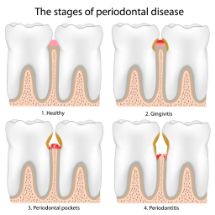
Currently, an estimated 5.8 million people are living with Alzheimer’s disease in the U.S (approximately 200,000 of which are under the age of 65). Sadly, dementia is now the 5th leading cause of death worldwide. Doctors, researchers, and patients alike have been frustrated with the lack of understanding of this disease, both in terms of what causes it and how to treat and prevent it. Recently, however, surprising evidence has been found that the same bacteria that causes gum disease may play a big role in the development of Alzheimer’s. Keep reading to learn more about this important topic and find out how a dentist in Charlottesville can help you keep your gums healthy and potentially reduce your risk of this disease.
What Does the Research Say About Gum Disease and Alzheimer’s?
As a recent article from New Scientist explains, many doctors are questioning the long-standing hypothesis that Alzheimer’s is caused by amyloid plaques in the brain.
Instead, they think these plaques may be in response to an infection of the brain caused the same bacteria that causes gum disease, Porphyromonas gingivalis (or P. gingivalis). Studies are ongoing and researchers aren’t exactly sure how this bacteria enters the brain.
However, plaque and tartar are partly made of this bacteria. It’s thought that when it collects under the gumline, P. gingivalis easily enters the bloodstream, where it travels throughout the entire body, including the brain.
This bacteria doesn’t only cause inflammation of the gums (called gingivitis or periodontal disease), but can also lead to inflammation in the brain and other areas of the body.
Again, researchers aren’t able to make conclusive statements yet. But many are hopeful that this information will lead to a better understanding of Alzheimer’s disease, and ultimately, better ways of preventing and treating it.
How Can You Improve Your Gum Health?
In addition to its link to Alzheimer’s, gum disease is also the leading cause of tooth loss. It’s also a known risk factor for heart disease, stroke, pregnancy complications, and even some cancers.
That’s why, although studies are ongoing, there’s no question that it’s worthwhile to keep your gums healthy! Here are a few simple things you can do:
- Schedule regular checkups – The first step is scheduling a checkup to have your gums examined. If you have healthy gums or mild gingivitis, regular checkups and good oral hygiene habits will maintain them. If you have moderate or advanced gum disease, a dentist will recommend gum therapy.
- Gum therapy – A procedure called scaling and root planing (or a “deep cleaning”) is usually the first recommendation for gum disease. This procedure thoroughly removes plaque and tartar and smooths the roots to prevent bacteria from re-accumulating under the gumline.
- Maintain great oral hygiene – Good oral hygiene habits are essential for gum health. Brush at least twice each day and floss once. You might also consider tools like an electric toothbrush and oral irrigator to help you be more effective.
Unfortunately, an estimated 65 million Americans have some form of gum disease. While the consequences of this common condition are serious, regular dental care and a few good habits at home can significantly reduce the risks!
About the Author
Dr. Hal M. Lippard is a dentist in Charlottesville who wants to help all of his patients lead long, healthy lives. With a commitment to providing high-quality, comprehensive dental care, he always educates his patients on how to maintain healthy gums and potentially reduce their risk of diseases such as Alzheimer’s. If you have any other questions about your gums, he can be contacted through his website.